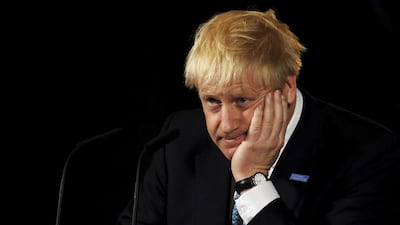In times of trouble, I often turn to literature and history. Writers from the past remind us there is nothing new about despair over dismal political leadership. For some reason that lifts my spirits. Britain needs cheering up now.
The arrival of Boris Johnson as prime minister signals a turbulent period ahead. On the day of his private meeting with Her Majesty the Queen, he made his first prime ministerial gaffe. He revealed – in a breach of long-established protocol – what the Queen had said to him.
He said that she does not understand why anyone would want to be prime minister. But, of course, Mr Johnson has wanted the job since his school days.
When it comes to foreseeing trouble ahead from his leadership, it’s not necessary to go through all the reasons in detail. Essentially the United Kingdom may crash out of the European Union by October 31 without a deal.
Mr Johnson, elected by fewer than 100,000 Conservative party members, could therefore choose one of two paths. He could be the prime minister of the entire country, 66 million British citizens, and try to bring us together. Or he could – as his predecessor Theresa May did – choose to focus only on the 17.4 million who voted for Brexit in 2016, and pretend as she did that departing the EU is "the will of the people".
It was “the will” only of some people three years ago, and times and minds have changed.
Interestingly Mr Johnson has chosen an even narrower path. He has chosen to be the prime minister of the small group of Brexit hardliners who are prepared to crash out of the EU on October 31 without a deal. Mr Johnson says it’s “do or die”, although he may not be the one either doing or dying. Nevertheless, he has sacked or lost 17 government ministers in five hours, which is bold and extremely risky.
Most new leaders seek to extend the hand of friendship to at least some key rivals. Mr Johnson has instead chosen to turn them into potential enemies.
Talking on TV is Mr Johnson’s great political skill. He entered Downing Street saying that “the buck stops” with him. The trouble is that his once striking have come to sound more like the performance of an actor rather than a true leader.
The “buck stops here” was a sign on the desk of US president Harry Truman, who took responsibility for, among other things, dropping atomic bombs on Japan in the Second World War.
Boris Johnson, however, has a track record of irresponsibility, both in his public and private life. His history is more that of a “buck passer”. So many of his projects sound great and yet come to nothing.
As foreign secretary, he compounded the troubles of Nazanin Zaghari-Ratcliffe, the British-Iranian woman unjustly held by the Iranian government in a Tehran jail. As Mayor of London, he promised to build a Garden Bridge that cost £53 million and has never been materialised.
For years I have watched Mr Johnson’s rise – Mayor of London, foreign secretary, now prime minister – wondering just how much his acting abilities rather than his achievements have got him where he is today.
He has been a witty performer on British TV comedy panel shows, and on political campaigns, playing the charmingly chaotic Old Etonian posh boy.
He can quote Latin. Some comedians suggest he may be a stupid person’s idea of what an intelligent person is like.
To my delight, I recently found a book on my shelves titled Prejudices by the acid-tongued American writer H L Mencken. It fell open and I could not put it down. Mencken's observations about actors and politicians include the following: "Of all actors, the most offensive to the higher cerebral centres is the one who pretends to intellectuality. His alleged intelligence, of course, is always imaginary: no man of genuinely superior intelligence has ever been an actor." He goes on to say that "an actor never disdains anything that gets him applause and money," and that "a good politician under democracy is quite as unthinkable as an honest burglar".
Now, I have met some truly clever actors and some truly good politicians, but Mencken made me smile. When he turned his acerbic wit on the kind of leaders democracy sometimes throws up, he suggested that in a country brimming with talented people – as America was in the 1920s when he was writing and as Britain is now – voters sometimes end with the worst possible choice.
He says this is like a hungry man at a banquet looking around at all the wonderful food on offer, only to “turn his back upon the feast and stay his hunger by catching and eating flies”.
Boris Johnson may prove me wrong and become a shining star, just like his hero Winston Churchill. But I doubt it.
As Mencken often quipped when faced with problems, “the only solution is work”. Mr Johnson not known for his work ethic. We will find out if it really is “do or die” in less than 100 days.
Gavin Esler is a journalist, author and television presenter


